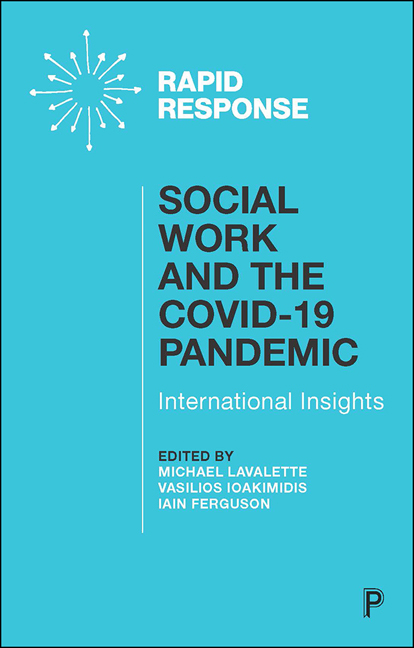16 - Working With Women Receiving Social Services During COVID-19: Reflections From Children and Families’ Practitioners
Published online by Cambridge University Press: 23 March 2021
Summary
Social distancing rules during the coronavirus pandemic forced Children and Families Social Work to focus only on its core legislated tasks, and what has emerged is a system that fails to respond humanely to women and children drawn into the child protection system, further contributing to women's oppression.
COVID-19 and domestic abuse
Support services for those experiencing domestic abuse has reported a significant increase in calls to helplines and online searches for information and assistance (Social Care Institute for Excellence June 2020).
What are child protection services noticing?
Domestic violence has been a dominant feature within child protection for a long time. Although we may currently be seeing a huge number of child protection referrals, it is challenging to compare before and after COVID-19 because the system has been overwhelmed with domestic abuse cases for years. The Office for National Statistics reported that in the year ending March 2019 the Crime Survey for England and Wales estimated 1.4 million women had experienced domestic abuse, giving us an indication to the scale of the problem (Office for National Statistics 2019).
When we cannot refer women affected by domestic abuse to external services for face-to-face support because they have pulled back, and when social distancing means that we cannot go into homes to focus on therapeutic and relationship-based direct work, it becomes apparent that we are left to simply monitor women and children. The impact on women is one of punishment and surveillance. Research tell us that pre-COVID support for women experiencing domestic abuse was, at best, under-resourced. Women have reported that they feel social work particularly blames them by using a narrative that portrays them as putting their children at risk when continuing to stay with an abusive partner (Keeling and Wormer 2012). There is little cognisance taken for the dynamics of an abusive relationship, the elements of control and coerciveness that form over time, leaving a woman feeling trapped. Therefore, prior to COVID-19, many felt that social work added to the oppression of women rather than challenging it.
During the pandemic, social workers report that the pressure remains to complete visits to families within procedure-led timescales (Turner, Blackwell and Carer 2020).
- Type
- Chapter
- Information
- Social Work and the COVID-19 PandemicInternational Insights, pp. 117 - 124Publisher: Bristol University PressPrint publication year: 2020

